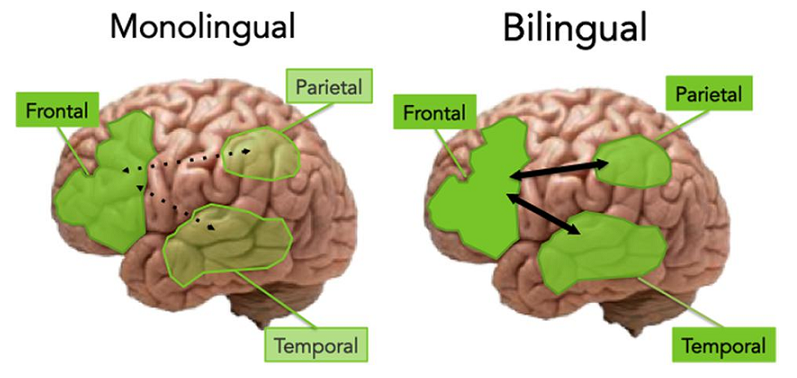
Neuroscience has long been interested in how language shapes our brain’s structure and function. It seems that rare linguistic skills might contribute to a cognitive reserve that could protect against the effects of aging. From polyglots who speak multiple languages fluently to individuals with exceptional capabilities in understanding and creating complex linguistic structures, these skills are not just intriguing but potentially crucial in understanding brain aging. Here we explore the realms of cognitive health and neuroplasticity and examine how extraordinary language abilities influence the aging brain.
Contents
Understanding Rare Linguistic Skills
To fully appreciate the impact of rare linguistic skills on brain aging, it’s essential to first understand what these skills entail. Linguistic abilities, in their most common form, involve the use of language for communication. However, rare linguistic skills go beyond basic communication, encompassing an extraordinary ability in understanding, learning, and using languages.
Definition and Examples of Rare Linguistic Skills
Rare linguistic skills refer to the exceptional ability to understand, learn, or use languages in a way that is significantly beyond the average. This could include polyglots, who fluently speak several languages, or individuals with an extraordinary talent for quickly learning and mastering new languages. Examples include hyperpolyglots like Giuseppe Mezzofanti, who was known to speak over 30 languages fluently, and people who have an innate ability to understand complex linguistic structures or create new languages.
The Uniqueness of Rare Linguistic Abilities
What sets these abilities apart is not just the number of languages one can speak, but also the depth of understanding and the speed of acquisition. For most people, learning a new language is a prolonged process requiring extensive exposure and practice. In contrast, those with rare linguistic skills can often grasp new languages with relative ease and at an astonishingly rapid pace. This uniqueness could be due to a variety of factors, including cognitive, neurological, and environmental elements.
Comparative Analysis of Rare Linguistic Skills with Common Linguistic Skills
In comparing rare linguistic skills with common linguistic abilities, several key differences emerge. While common linguistic skills involve the ability to communicate effectively in one’s native language and perhaps one or two additional languages, rare linguistic skills represent a significantly higher level of proficiency and flexibility in language use. This comparative analysis is not just about the quantity of languages known, but also about the quality of understanding and the cognitive processes involved in managing multiple linguistic systems simultaneously [1].
The Brain and Language
Understanding how the brain processes language is key to appreciating the impact of rare linguistic skills on brain aging. Language is a complex cognitive function, involving multiple brain regions and neural pathways.
Basic Brain Functions in Language Processing
The human brain processes language through an intricate network of neurons and brain regions. This process involves several cognitive functions, including auditory and visual processing, memory, attention, and executive functions. When we speak, listen, read, or write, our brain is not only recognizing words and grammar but also interpreting meaning and context. This complexity makes language processing one of the most demanding cognitive tasks, engaging a wide array of neural resources.
Areas of the Brain Involved in Linguistic Skills
Several key areas of the brain are crucial for language processing. The Broca’s area, located in the frontal lobe, is mainly responsible for speech production and language processing. The Wernicke’s area, in the temporal lobe, is crucial for language comprehension. Additionally, the angular gyrus, also in the temporal lobe, plays a role in complex language functions like reading and interpretation of metaphors. These areas are interconnected and work in concert to enable fluent communication and language understanding [2].
Neuroplasticity and Language Acquisition
Neuroplasticity refers to the brain’s ability to reorganize itself by forming new neural connections throughout life. This ability is crucial in language learning and acquisition. The brain’s plastic nature allows it to adapt and change in response to new language experiences, which is especially evident in individuals acquiring rare linguistic skills. Their brains can accommodate multiple languages by creating and strengthening new neural pathways, a process that can have profound implications on cognitive abilities and the aging process of the brain.

Impact of Rare Linguistic Skills on Brain Aging
The relationship between rare linguistic skills and brain aging is a captivating area of study. While the aging process naturally impacts cognitive functions, including language, individuals with rare linguistic abilities may experience this differently.
Cognitive Reserve and Brain Aging
Cognitive reserve refers to the brain’s ability to improvise and find alternative ways of completing tasks when faced with challenges, such as the natural aging process. Individuals with rare linguistic skills are believed to have a higher cognitive reserve due to their brain’s ability to manage and process multiple languages. This enhanced reserve can potentially delay the onset of age-related cognitive decline. Engaging in complex linguistic tasks is thought to strengthen neural networks, thereby providing a buffer against the loss of cognitive functions in later years [3].
Case Studies of Individuals with Rare Linguistic Skills
Examining the lives of individuals with rare linguistic abilities provides valuable insights into the potential protective effects of these skills on brain aging. For instance, case studies of multilingual individuals have shown a delay in the onset of Alzheimer’s disease and other forms of dementia compared to monolingual individuals. These cases suggest that the mental agility required to switch between languages and the constant exercise of complex linguistic skills can contribute to a more resilient brain.
Scientific Research Linking Linguistic Abilities and Cognitive Decline
Recent scientific research has begun to unravel the connection between linguistic abilities and cognitive decline. Studies indicate that bilingualism and multilingualism can have a protective effect on the brain. These studies focus on various aspects, such as the age of onset of cognitive impairment in multilingual individuals, the rate of decline, and the overall impact on brain health. The evidence points towards a significant relationship between rare linguistic skills and a slower rate of cognitive decline, suggesting that these skills could play a role in maintaining cognitive health in aging populations.
The Neuroprotective Role of Bilingualism and Multilingualism
Bilingualism and multilingualism are often considered a form of rare linguistic skill, particularly when proficiency in multiple languages is high. These abilities provide an interesting lens through which to view the effects of language skills on brain aging. This section explores the protective roles of bilingualism and multilingualism, examining the differences in cognitive processes between monolingual and multilingual brains and the benefits of bilingualism on cognitive health.
Differences Between Monolingual and Multilingual Brains
The brains of bilingual and multilingual individuals function differently from those of monolinguals. Research shows that managing multiple languages involves complex cognitive processes, including enhanced attention, working memory, and executive functions. Bilinguals often display greater mental flexibility and improved problem-solving skills. Neuroimaging studies reveal that bilinguals use their brains more efficiently, particularly in the areas responsible for executive control and attention [4].
The Benefits of Bilingualism on Cognitive Health
Bilingualism and multilingualism have been linked with various cognitive health benefits. Studies have shown that bilingual individuals often experience a later onset of dementia and Alzheimer’s disease compared to their monolingual counterparts. The act of switching between languages and maintaining proficiency in multiple languages appears to provide a form of mental exercise that strengthens cognitive reserve. This exercise is thought to enhance the brain’s ability to compensate for age-related changes and damage.
Challenges and Limitations of the Research of Multilingualism and Neuroprotection
While the evidence supporting the cognitive benefits of bilingualism is compelling, it’s important to acknowledge the challenges and limitations in this research area. Differences in study designs, methodologies, and participant profiles can lead to varying conclusions. Additionally, bilingualism is just one of many factors that influence cognitive health, and it’s crucial to consider these abilities in the context of other lifestyle and genetic factors.

Enhancing Brain Health Through Linguistic Skills
The potential of linguistic skills to enhance brain health, especially as we age, is an area of great interest and importance. While the acquisition of rare linguistic skills is exceptional, even the pursuit of language learning at a more basic level can be beneficial for cognitive health.
Language Learning as a Cognitive Exercise
Learning a new language is a powerful exercise for the brain, involving complex cognitive processes. It challenges the brain to recognize new sounds, learn new grammatical structures, and memorize new vocabulary. This process stimulates the brain, enhancing cognitive functions such as memory, attention, and problem-solving skills. For adults, especially older adults, language learning can be an effective way to engage the brain, potentially delaying cognitive decline and improving overall brain health [5].
Practical Tips for Developing Linguistic Skills at Any Age
Developing linguistic skills is a lifelong journey and can be started at any age. Here are some practical tips for those interested in enhancing their language abilities:
- Start with an interest: Choose a language that you are genuinely interested in learning, as this will keep you motivated.
- Make it a daily habit: Regular practice, even if it’s just a few minutes a day, is more effective than sporadic, intensive study sessions.
- Use technology: Take advantage of language learning apps, online courses, and virtual language exchange programs.
- Immerse yourself: Try to immerse yourself in the language through movies, music, books, and speaking with native speakers.
- Set realistic goals: Setting achievable goals will help maintain motivation and measure progress.
Future Directions in Research and Application
Looking forward, the field of linguistic skills and brain health is ripe for further research. Future studies could explore the long-term effects of language learning on cognitive decline, the impact of learning different types of languages, and how technology can best be used to support language learning in various age groups. Additionally, the application of these findings in practical settings, like education and senior care, could revolutionize approaches to maintaining cognitive health with age.
References
[1] The Impact of Learning a Language on Brain Health
[2] Language and the Aging Brain: Patterns of Neural Compensation Revealed by Functional Brain Imaging
[3] How aging and bilingualism influence language processing
[4] Learning a Second Language May Protect an Aging Brain
[5] Language Development across the Life Span: A Neuropsychological/Neuroimaging Perspective

